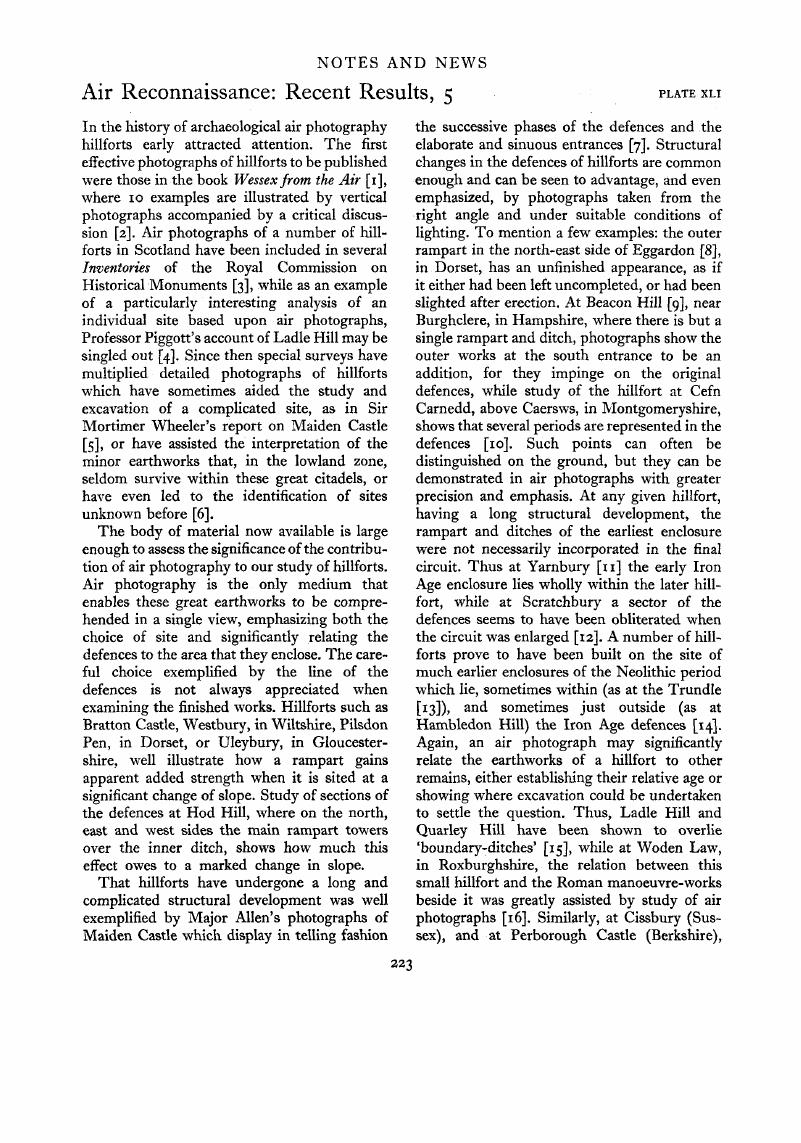No CrossRef data available.
Published online by Cambridge University Press: 02 January 2015

[1] Crawford, O. G. S. and Keiller, A., Wessex from the Air (1928)Google Scholar.
[2] Written by one or other of the two authors, save for that of Hambledon Hill by Dr Eric Gardner.
[3] RCHM, Inventory of Fife, Kinross and Clackmannan (1933)Google Scholar, figs. 10–13.
[4] Piggott, S., [[antiquity]], 1931, 474–85Google Scholar, pls. I–V.
[5] R. E. M. Wheeler, Maiden Castle, Dorset. Rept. Res. Committee Soc. Antiq., 12, 1943.
[6] E.g. Woodbury, Wilts. Wessex from the Air, 80–1, pl. VIII.
[7] Maiden Castle, Dorset, pls. LXIX, LXXIV, XCIII–XCIV. Many more photographs of the site, taken by Major Allen, are in the collection of the Ashmolean Museum, Oxford.
[8] RCHM, Inventory of Dorset, 1 (1952), 13–15 Google Scholar, plan on p. 14, pl. LXXI.
[9] Williams-Freeman, J. P., Field Archaeology as Illustrated by Hampshire (1915), 85–9Google Scholar and plan facing 356.
[10] For a brief note on this hillfort see RCHM, Inventory of Montgomeryshire (1911), 6Google Scholar8.
[11] Wessex from the Air, 68–70, pl. vi; Arch. J., CIV, 1948, 29, 33Google Scholar, fig. 2. on p. 31.
[12] Air Survey and Archaeology (1928), 36–7Google Scholar, pl; XII; Grinsell, L. V., The Archaeology of Wessex (1958), 173Google Scholar.
[13] Curwen, E. C., The Archaeology of Sussex (1937), 90–2Google Scholar, fig. 16, pl. VI. See also Curwen, , antiquity, 1930, 22Google Scholar.
[14] Wessex from the Air, 44, fig. 5, pl. III. For the date of the work see Proc. Dorset Arch. Soc., LXXIII, 1952, 105–6 Google Scholar.
[15] Perhaps of late Bronze Age date: for Ladle Hill see Piggott, S., antiquity, 1931, 477Google Scholar, fig. 2; for Quarley Hill, O. G. S. Crawford, Air Survey and Archaeology (1928), 4, 32 Google Scholar, pl. X; Wessex from the Air, 77; Hawkes, C. F. C., Proc. Hants. F.C., XIV, 1939. 136 Google Scholar.
[16] RCHM, Inventory of Roxburghshire (1956), 169–72Google Scholar, fig. 197, pl. XXXI.
[17] For Cissbury, see The Archaeology of Sussex, fig. 68, pl. XXI; for Perborough Castle, P. P. Rhodes, Oxoniensia, 15, 1950, 22 Google Scholar.
[18] For sketch plan, see Wessex from the Air, 36. A detailed survey of the earthworks will accompany Professor Richmond’s monograph on this site.
[19] The Archaeology of Sussex, figs. 68–9, pl. XXI.
[20] No one photograph, for example, can bring out all the hollows and hut-positions on Hambledon Hill, because of the convex surface of the ground, cf. Wessex from the Air, pl. II.
[21] The number of instances in which crop-marks have revealed buried features within hillforts is not negligible. Examples include Romano-British buildings at Tidbury Ring (Hampshire), a native ‘settlement’ at Casterley (Wiltshire), a Middle Bronze Age enclosure on Ram’s Hill (Berkshire), pits, of uncertain age, at Eggardon (Dorset), enclosures at Brandon camp (Herefordshire).
[22] RCHM, Inventory of Herefordshire, III (1932), 55–7 Google Scholar, plan p. 56, pls. 116–18.